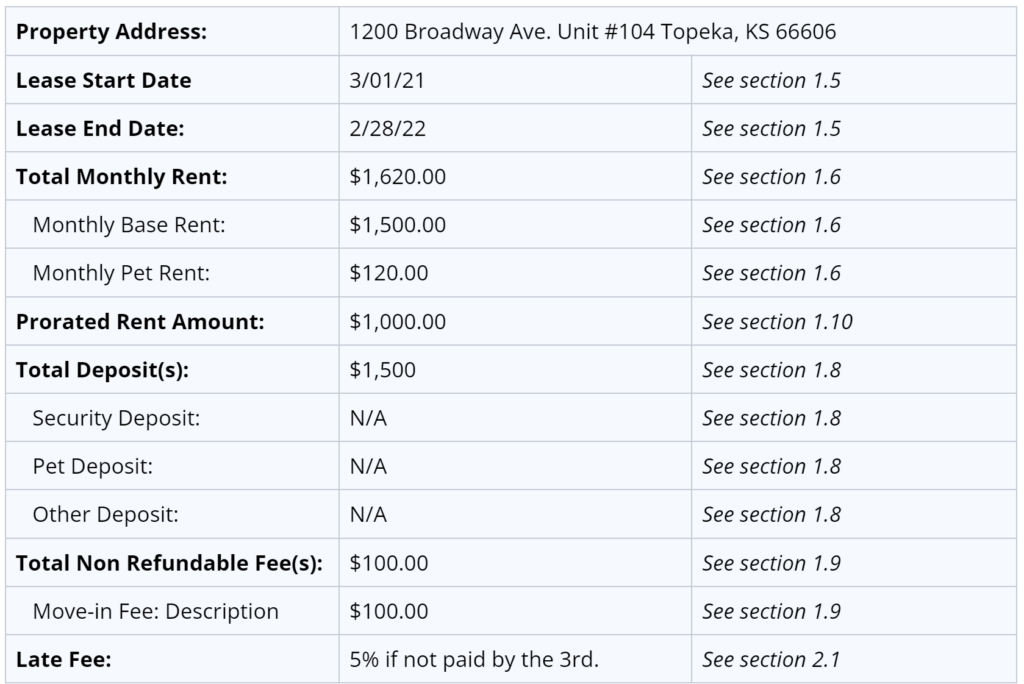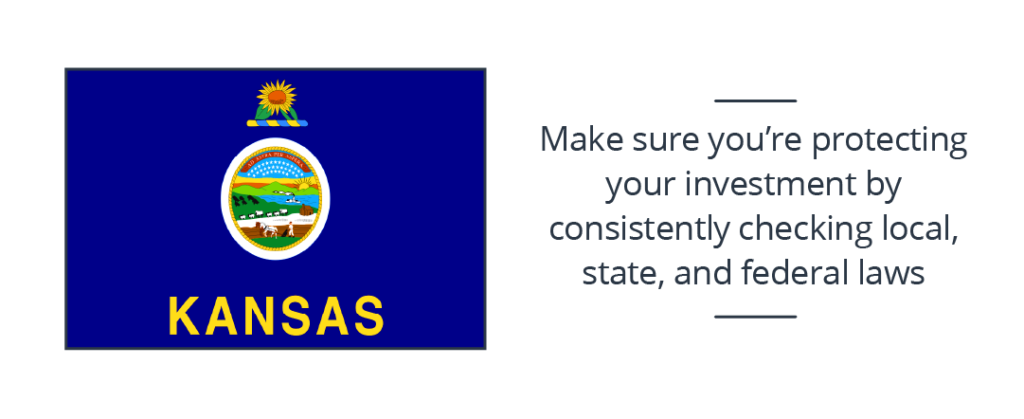Kansas isn’t just great barbecue and small towns. With its population increasing, so are home values, which are expected to climb 3.8% in the next year making now a great time to invest in rental properties. Kansas has a low unemployment rate, lots of history, great sports teams, and, of course, midwest hospitality making it a top contender for people looking to relocate.

Laws that impact the rental market, landlords, and tenants are constantly being decided in states. Make sure you know what’s on your ballot – find Kansas voting information here.

Kansas Renters’ Rights and Landlord Responsibilities
- Return security deposit within 30 days
- Landlords may charge whatever they deem reasonable for rent
- Must give reasonable notice to enter property
- Required to make repairs in a timely manner
When it comes to Kansas rental laws, there are a few specifics landlords need to know:
- Security Deposits – Landlords must return the security deposit within 30 days of a tenant moving out. Tenants may also request the security deposit be returned within 14 days. If landlords do not return the deposit before this time, then they may be required to pay up to 1.5 times the amount.
- Rent – Kansas has no legal maximum for what a landlord may charge for rent. There is also no limit on the amount a landlord may raise the rent, but they must provide at least 30 days’ notice. Kansas does not limit how much a landlord may charge as a late fee.
- Notice for Entry – Kansas requires the landlord to provide notice before entering the rental property, although the exact amount of time is not specified.
- Making Repairs – It is the landlord’s responsibility to keep the rental in safe and healthy living conditions. If the landlord fails to do so, the tenant may deliver them a written notice of what needs to be repaired or replaced. The landlord must make the repairs within a reasonable timeframe, though the exact time is not specified by law.
Kansas Landlords’ Rights and Tenant Responsibilities
- Tenants must keep the property in safe and habitable conditions
- Must notify landlord 30 days before terminating a lease
- No limit for late fees
Rental Application Fees
There are no additional rental application fee laws in Kansas.
Criminal Background Check
- HUD (Federal) laws do not classify criminal backgrounds as a protected class, but making a decision to rent based on a criminal background alone could lead to a discrimination charge as it impacts certain protected groups of people disproportionately.
- However, if the criminal background check revealed a crime for the manufacture and distribution of drugs, homicide and/or stalking, denying the application is allowed.
- Landlords should have a consistent and equal policy or procedure in place to follow regarding criminal background checks so as not to discriminate against one class of people over another.
- HUD states that a landlord cannot ask about arrest records, only convictions, as innocent people are commonly arrested though the situation may not have resulted in a conviction.
- Some municipalities may have written their own laws expanding onto what you can and cannot ask regarding criminal backgrounds during the tenant screening process.
Security Deposits
- Landlords can collect up to one month’s rent as the security deposit for unfurnished units and 1.5 month’s rent for a furnished unit. Landlords can charge an extra ½ month’s rent if pets are allowed.
- If a security deposit is collected, landlords must provide a written move-in inspection report to create a written record.
- Landlords must return the security deposit either:
- 14 days after the landlord determines deductions (other than for rent).
- 30 days after the lease term ends and the tenant vacates the unit.
Notice Before Entry
Landlords must provide a “reasonable” amount of notice before entering the unit, which is usually 24 hours.
Repairs
Landlords must make repairs within 14 days after receiving notice.
Build a Kansas lease agreement in less than 15 minutes.
Kansas Landlord-Tenant Law FAQ
Below are answers to some of the most commonly-asked questions when it comes to landlord-tenant laws in Kansas:
Can You Withhold Rent in Kansas?
The only case in which a tenant may withhold rent in Kansas is under the repair and deduct statute. This takes effect if the landlord fails to make necessary repairs then the tenant may pay for the repairs and deduct the cost from their next rent payment.
How Long Does it Take to Evict a Tenant in Kansas?
The process to evict a tenant in Kansas can take anywhere from three to 30 days depending on the type of eviction.
Is Kansas a Landlord-Friendly State?
Kansas is a moderately landlord-friendly state. There are no rent control laws, and tenants are unable to withhold rent unless it is for repairs.
What is the Eviction Process in Kansas?
There are three reasons a landlord may file for eviction in Kansas. Failure to pay rent, violation of the lease agreement, and the end of a lease term. For failure to pay rent, the landlord must give a three-day notice to cure before they can file for eviction. For a violation of the lease, landlords must supply the tenant with 14 days to correct the violation, and for the end of a lease, landlords must provide seven or 30 days depending on the lease.
If the tenant does not cure their violation or move out, the next step is for the landlord to file a complaint in court. The tenant must then be served the summons and complaint within three days. The first hearing must be held within three to 14 days after the tenant was served. If the judge rules in favor of the landlord, then a writ of restitution will be issued to the tenant within a few hours to a few days. The tenant then has 14 days to move out.
How Much Notice Does a Landlord Have to Give a Tenant to Move Out in Kansas?
Landlords must give tenants a one-month notice to move out. For fixed lease tenants, landlords do not have to supply a notice.
Due Diligence and Kansas Rental Laws
TurboTenant has utilized many municipal sources along with official state statutes in order to compile this information to the best of our ability. However, local laws are always in flux, and landlords and tenants alike should be sure to do their due diligence and consult legal help when it’s needed. We hope the following list can serve as a valuable resource and allow you to succeed as a landlord or tenant in Kansas. Be sure to take proper precautions when it comes to finding the top candidates for your unit by utilizing our online rental application and tenant screening services.
Disclaimer: TurboTenant, Inc does not provide legal advice. This material has been prepared for informational purposes only. All users are advised to check all applicable local, state, and federal laws and consult legal counsel should questions arise.

Unlimited Everything.
Create a single Kansas lease agreement, or subscribe and receive unlimited lease agreements, landlord forms pack, and e-signs for a simple annual fee. Be confident with all the legal forms and tools you need as a professional landlord.
Discover Our Unlimited PlanKansas Landlord-Tenant Law Resources
Kansas Fair Housing Resources
Other State Resources
- Security Deposit Statute
- Duties of Landlord Statute
- Duties of Tenant Statute
- Kansas Tenants Handbook
Kansas Associations
Kansas City-Specific Housing Resources
Wichita
- Fair Housing – City of Wichita
- Apartment Association of Greater Wichita
- REALTORS® of South Central Kansas
Overland Park
- Rental Licensing and Inspection – City of Overland Park
- Kansas City Regional Association of REALTORS®
Kansas City
- Fair Housing – City of Kansas City
- Apartment Association of Kansas City
- Kansas City Regional Association of REALTORS®
Olathe
Topeka
Lawrence
- Rental Licensing for Tenants – City of Lawrence
- Fair Housing – City of Lawrence
- Lawrence Apartments Association
- Lawrence Board of REALTORS®
Shawnee
Manhattan
- Landlord & Tenant Information – City of Manhattan
- Fair Housing – City of Manhattan
- Manhattan Association of REALTORS®
Federal Fair Housing Resources






